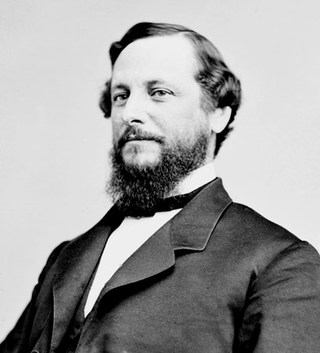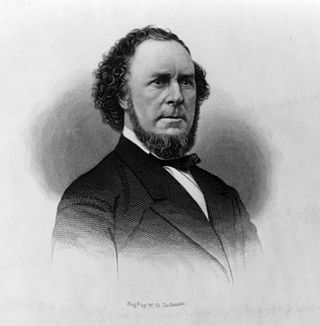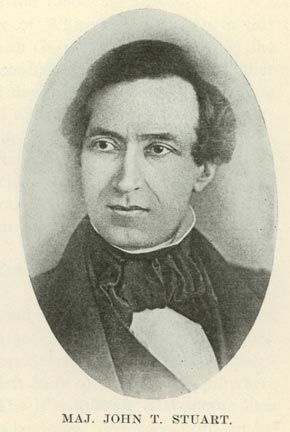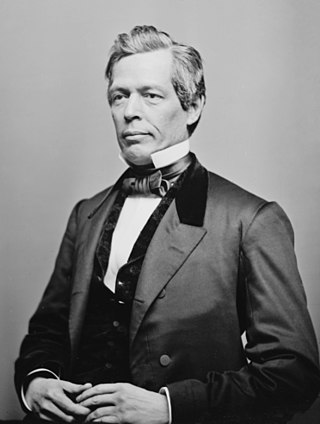- 1 2 3 Evans 1900 :314-316
- ↑ Evans 1900 : 298
- ↑ Trefousse, Hans Louis (2005). "First among equals": Abraham Lincoln's reputation during his administration. Fordham University Press. p. 53. ISBN 978-0-8232-2468-5.
- ↑ Williams, Frank J.; Holzer, Harold; Simon, John Y. (2007). Judging Lincoln. SIU Press. p. 138. ISBN 978-0-8093-2759-1.
- ↑ Ashley, James M. (April 1891). "The Passage of the Thirteenth Amendment to the Constitution". Magazine of Western History. XIII (6): 663–679.
Related Research Articles

The Thirteenth Amendment to the United States Constitution abolished slavery and involuntary servitude, except as punishment for a crime. The amendment was passed by the Senate on April 8, 1864, by the House of Representatives on January 31, 1865, and ratified by the required 27 of the then 36 states on December 6, 1865, and proclaimed on December 18. It was the first of the three Reconstruction Amendments adopted following the American Civil War.

George Hunt Pendleton was an American politician, lawyer and diplomat. He represented Ohio in both houses of Congress and was the unsuccessful Democratic nominee for Vice President of the United States in 1864.
The Radical Republicans were a political faction within the Republican Party originating from the party's founding in 1854—some six years before the Civil War—until the Compromise of 1877, which effectively ended Reconstruction. They called themselves "Radicals" because of their goal of immediate, complete, and permanent eradication of slavery in the United States. The Radical faction also included, though, very strong currents of Nativism, anti-Catholicism, and in favor of the Prohibition of alcoholic beverages. These policy goals and the rhetoric in their favor often made it extremely difficult for the Republican Party as a whole to avoid alienating large numbers of American voters from Irish Catholic, German, and other White ethnic backgrounds. In fact, even German-American Freethinkers and Forty-Eighters who, like Hermann Raster, otherwise sympathized with the Radical Republicans' aims, fought them tooth and nail over prohibition. They later became known as "Stalwarts".

The Corwin Amendment is a proposed amendment to the United States Constitution that has never been adopted, but owing to the absence of a ratification deadline, could theoretically still be adopted by the state legislatures. It would have shielded slavery within the states from the federal constitutional amendment process and from abolition or interference by Congress.

Thomas Corwin, also known as Tom Corwin, The Wagon Boy, and Black Tom was a politician from the state of Ohio. He represented Ohio in both houses of Congress and served as the 15th governor of Ohio and the 20th Secretary of the Treasury. After affiliating with the Whig Party, he joined the Republican Party in the 1850s. Corwin is best known for his sponsorship of the proposed Corwin Amendment, which was presented in an unsuccessful attempt to avoid the oncoming American Civil War.

John Armor Bingham was an American politician who served as a Republican representative from Ohio and as the United States ambassador to Japan. In his time as a congressman, Bingham served as both assistant Judge Advocate General in the trial of the Abraham Lincoln assassination and a House manager (prosecutor) in the impeachment trial of U.S. President Andrew Johnson. He was also the principal framer of the Fourteenth Amendment to the United States Constitution.

James Mitchell Ashley was an American politician and abolitionist. A member of the Republican Party, Ashley served as a member of the United States House of Representatives from Ohio during the American Civil War, where he became a leader of the Radical Republicans and pushed for passage of the Thirteenth Amendment, ending slavery in the United States. He also authored the resolution which started the first impeachment inquiry against Andrew Johnson. After the war, he served as Governor of the Montana Territory and president of the Ann Arbor Railroad.

John Brooks Henderson was an American attorney and politician who represented Missouri in the United States Senate from 1862 to 1869.

Alexander Long was a Democratic United States Congressman who served in Congress from March 4, 1863, to March 3, 1865.

Alexander Hamilton Coffroth was a Democratic member of the U.S. House of Representatives from Pennsylvania.

Samuel Sullivan "Sunset" Cox was an American Congressman and diplomat. He represented both Ohio and New York in the United States House of Representatives and served as United States Ambassador to the Ottoman Empire.

George Helm Yeaman was an American politician who served as a U.S. Representative from Kentucky from 1862 until 1865, and as U.S. Ambassador to Denmark from 1865 to 1870.

John Todd Stuart was a lawyer and a U.S. Representative from Illinois.

Joseph Ketchum Edgerton was an American lawyer and politician who served one term as a U.S. Representative from Indiana from 1863 to 1865.

Chilton Allen White was an American lawyer, politician, and white supremacist. He was a Democrat and a U.S. Representative from Ohio from 1861 to 1865.

Warren Perry Noble was an American educator, lawyer, and politician who served two terms as a U.S. Representative from Ohio from 1861 to 1865.

William Johnston was an American lawyer and politician who served one term as a U.S. Representative from Ohio from 1863 to 1865.

John Hutchins was an American lawyer and politician who served two terms as a U.S. Representative from Ohio from 1859 to 1863.

William Russell was a United States Representative from Ohio.

The Habeas Corpus Suspension Act, 12 Stat. 755 (1863), entitled An Act relating to Habeas Corpus, and regulating Judicial Proceedings in Certain Cases, was an Act of Congress that authorized the president of the United States to suspend the right of habeas corpus in response to the American Civil War and provided for the release of political prisoners. It began in the House of Representatives as an indemnity bill, introduced on December 5, 1862, releasing the president and his subordinates from any liability for having suspended habeas corpus without congressional approval. The Senate amended the House's bill, and the compromise reported out of the conference committee altered it to qualify the indemnity and to suspend habeas corpus on Congress's own authority. Abraham Lincoln signed the bill into law on March 3, 1863, and suspended habeas corpus under the authority it granted him six months later. The suspension was partially lifted with the issuance of Proclamation 148 by Andrew Johnson, and the Act became inoperative with the end of the Civil War. The exceptions to Johnson's Proclamation 148 were the States of Virginia, Kentucky, Tennessee, North Carolina, South Carolina, Georgia, Florida, Alabama, Mississippi, Louisiana, Arkansas, and Texas, the District of Columbia, and the Territories of New Mexico and Arizona.
References
- Evans, Nelson Wiley; Stivers, Emmons B (1900). A history of Adams County, Ohio: from its earliest settlement to the present time. West Union, Ohio: E B Stivers.
External links
- United States Congress. "Wells A. Hutchins (id: H001010)". Biographical Directory of the United States Congress . Retrieved on 2009-04-29
- Wells A. Hutchins at Find a Grave
![]() This article incorporates public domain material from the Biographical Directory of the United States Congress
This article incorporates public domain material from the Biographical Directory of the United States Congress
Wells A. Hutchins | |
|---|---|
 | |
| Member of the U.S.HouseofRepresentatives from Ohio's 11th district | |
| In office March 4, 1863 –March 3, 1865 |
